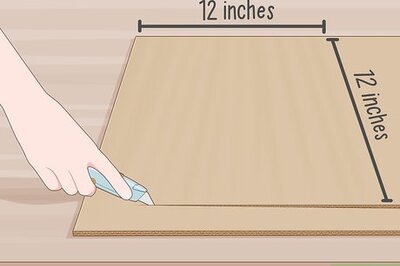
views
- Think about and practice what you'll say beforehand to avoid coming up blank during your session.
- Tell your therapist your goals for therapy so they can help you achieve them.
- Don't sugarcoat or conceal your thoughts. Your therapist is a trained and trustworthy confidante.
Speaking with Your Therapist

Practice what you are going to say beforehand. Get the tough stuff out as soon as possible. Plan out what you’re going to say and how you’re going to say it before you attend your sessions. You may have learned to stay silent as a coping mechanism or to keep yourself safe, but you don’t have to do this with your therapist. For instance, you might practice by introducing yourself and stating the reason you came. "Hi, I'm Matthew. I came in because I have been having trouble fitting in at school." Therapy is a safe place in which you are able to speak about how you feel in an open and supportive environment. Over time, you’ll likely find that opening up will become easier.

Express what you hope to achieve by attending therapy. Talk about the problem you want to overcome, the area in your life you want to improve upon, or whatever it is that brought you to therapy, during the first or second session. When you talk about your goals and expectations with your therapist, you can create benchmarks that you can use to measure your success along the way. For example, you might say, “I came here because I have problems socially. I would really like to have more friends and go out more.”

Share your thoughts and feelings openly. Don’t hold back. Talk to your therapist about everything you are feeling, even if you think it is unimportant. Not divulging everything could be detrimental to your recovery. Intentionally leaving out facts that you are embarrassed about or feel shy revealing could hinder you. If you’re not completely open with your therapist, you are essentially wasting your time. Be open by saying what you really feel--it's the only way your therapist can truly help. For example, say "I feel like a total loser because I'm always be myself when everyone else is always hanging out with friends in a group."

Think of your therapist as your closest confidante. And, remember that he or she is bound by law to protect your confidentiality. Know that you can tell your therapist anything and you won’t receive judgment or criticism. However, keep in mind that your therapist is bound by law to intervene if you express an intent to harm yourself or another person. Keep in mind that this is in your best interest. And also know that your therapist won’t leave you unexpectedly. The therapist/patient relationship is special, and one that can be comforting and beneficial.
Making the Most of Therapy

Find the right therapist for you and your needs. Look for a therapist who treats people who have problems similar to yours. Experienced therapists have seen the problems you are facing again and again, and will likely have a good idea about how to help you. For instance, many specialize in areas such as depression, eating disorders, anxiety, and so on. Finding a good therapist comes down to a mixture of factors, such as ensuring that the professional has experience with treating your issue, finding out their unique therapy style, and going for an initial session. If you find that you and the person get along well, and you feel better after your sessions, you may have found the right therapist for you. Meet with a few therapists to get a feel for their different styles and personalities. Don’t be discouraged if you don’t find your perfect fit at first; it’s important to take the time to find someone who is a good match for your needs. When comparing therapists' profiles, look for therapists who don't say that they can do everything, as it likely means they won't have the depth of expertise needed.

Ask your therapist to thoroughly explain the process. Talk to your therapist about the techniques and methods that will be used in your sessions. Don’t be afraid to ask questions; even if you feel they are personal. For example, if you are concerned about your therapist’s own life experience or beliefs concerning your treatment, you might say, “Are you religious? It’s important for me to talk to someone who believes in a higher power.” Although you may not receive a direct answer, you’ll receive an explanation as to why not, which may help you understand your therapist better and learn his or her boundaries. Ask the therapist to explain any business policies that might affect your work together, such as fees for cancelling appointments or talking after hours.

Have an open mind. Know that there isn’t a set time for how long you may need therapy, or that there is a method that works the best for everyone. Realize that although you may think what the therapist asks of you won’t work, you should still give it a chance. You never know, you may be pleasantly surprised. Be willing to go along with what the therapist suggests, even if it is outside of your comfort zone. Doing so may help you finally experience the breakthrough you’ve wanted. Some therapists like to assign “homework” or work you do between sessions to advance your skills or understanding. Try to complete these assignments and take them seriously to see personal growth.

Let your thoughts flow by journaling about them first. Write down your feelings, fears, anxieties, frustrations, and whatever else is on your mind on that blank piece of paper. You’ll probably be surprised at how liberating it feels to get what is going on inside of you out into the open. Then, bring your journal to a session. You may find that reading your entries to your therapist helps get the conversation going easier.
Making Progress

Speak up if you don’t feel understood or heard. Give your therapist a chance to understand what you are saying by going into more detail or explaining the situation in another way. If you feel like your therapist is misconstruing what you say, or isn’t “getting” you, don’t give up right away. Tell him or her your frustrations and feelings and work together to develop a plan that helps you become understood. “No, you don’t understand. What I’m trying to say is…” is a good start to clearing up a misunderstanding.

Apply what you learn in sessions to everyday life. Use the tools your therapist and sessions have given you during your everyday life. Therapy works best when you are able to use it outside of the confines of the therapist’s office. Plus, by using what you’ve learned, you may be able to explore other areas of your life you were afraid to before. For example, if your therapist has challenged you to put your new social skills to the test at school, you should do it. Think about the strategies you have learned, and try to put them into practice. Go up to someone and start a conversation. Join a new club or organization.

Make the decision to leave, if you need to. If you are not comfortable or making any progress, you may need to choose a different therapist. Know that it may take several different therapists until you find the one who is right for you. You may not feel comfortable with the way the therapist speaks to you, or you just may not feel in your gut that this therapist is right for you. Don’t be afraid to leave if you aren’t happy with your experience. Make sure to talk with your therapist about the reason why you are ending your therapy with them. This will provide closure for both of you, and your therapist may even be able to recommend someone who can better meet your needs.
Know when to seek additional help. Therapy may be effective on its own, but you may need to seek additional help if your symptoms are interfering with your daily life or affecting your quality of life. Talk with your primary care provider or therapist if you are having trouble coping with your symptoms using therapy alone. You may need to seek the help of a psychiatrist. A psychiatrist is a medical doctor who is trained to treat mental health disorders. After a psychiatric evaluation, they may prescribe a medication to help with your symptoms and act as a complement to your therapy.



















Comments
0 comment